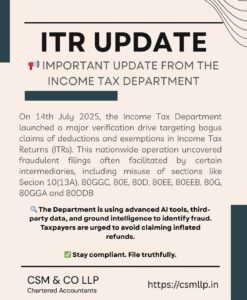Crackdown on Fraudulent ITR Claims: What Every Taxpayer Should Know
July 14, 2025

The Income Tax Department of India has launched an aggressive crackdown on fraudulent deduction claims in Income Tax Returns (ITRs). Powered by AI and advanced data analytics, this crackdown is now targeting suspicious claims under specific deduction sections—some of which have been commonly misused by both individuals and intermediaries.
Here’s what you need to know to stay safe and compliant.
A sharp rise in false or exaggerated claims made under various sections of the Income Tax Act has prompted the government to act. Fraudulent practices—often facilitated by unverified intermediaries—are now being flagged by the Income Tax Department’s advanced detection tools.
The crackdown focuses on deductions claimed under the following sections:
• Section 10(13A) – House Rent Allowance (HRA)
• Section 80GGC – Donations to political parties
• Section 80E – Interest on education loans
• Section 80D – Health insurance premiums
• Section 80EE – Interest on home loans for first-time buyers
• Section 80EEB – Interest on loans for electric vehicles
• Section 80G – Donations to registered charities and relief funds
• Section 80GGA – Donations for scientific research and rural development
• Section 80DDB – Medical treatment for specified critical illnesses
Many of these claims were found to be either inflated or entirely bogus—submitted with fake documents or no proof at all.

The Income Tax Department is now leveraging AI and data analytics to automatically flag suspicious deduction patterns across thousands of returns. Real-time cross-verification has also been implemented to compare taxpayer claims with actual data from:
• Banks and financial institutions (for loan interest and repayments)
• Insurance companies (for policy premium verification)
• Employers (for rent and HRA)
• Recognized donation platforms and political party disclosures
If a claim doesn’t match backend data, the taxpayer may receive a notice or demand.
1. Fake HRA Claims (Section 10(13A)): Claiming rent deductions using fictitious landlords or PANs.
2. Bogus Political Donations (Section 80GGC): False declarations to inflate refund amounts.
3. Fake or Inflated Education Loan Interest (Section 80E): Claiming deductions for non-existent loans.
4. Unsubstantiated Medical Claims (Section 80DDB): Claims without medical certificates or treatment proof.
5. Misuse of Health Insurance (Section 80D): Deducting for lapsed or ineligible policies.
6. Invalid Home Loan or EV Loan Interest (Sections 80EE & 80EEB): Claiming interest deductions without ownership or valid financing.
7. Questionable NGO Donations (Section 80G, 80GGA): Submitting receipts from unapproved or blacklisted institutions.
The Department has already taken action in major cities like Mumbai, Delhi, Jaipur, and Ahmedabad. Hundreds of notices have been served, and several searches and surveys have been conducted under Sections 132 and 133A of the Income Tax Act.
Penalties for false deduction claims may include:
• Demand for repayment of refunds with interest and penalties
• Prosecution under Sections 276C (evasion) and 277 (false statements)
• Imprisonment, in extreme cases
You can file an Updated Return (ITR-U) for Financial Year 2023–24 up to March 31, 2026. This gives taxpayers a chance to rectify mistakes without attracting harsher consequences—but the longer the delay, the higher the interest and penalties.
The Income Tax Department’s message is clear: fraudulent deductions won’t go unnoticed. With technology closing the loopholes, it’s time for every taxpayer to clean up their returns and ensure compliance.
Transparency is not just good practice—it’s now a legal necessity.
Read the source of this post by clicking here.
Disclaimer:
This article is for general informational purposes only and should not be considered professional advice. Please consult a qualified expert for advice tailored to your specific situation. The author and website owner are not liable for any errors or actions based on this content.